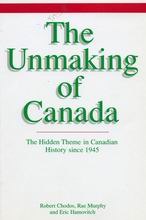
The Unmaking of Canada
The Hidden Theme in Canadian History since 1945
Chodos, Robert, Murphy, Rae, Hamovitch, Eric
Publisher: James Lorimer, Canada
Year Published: 1991
Pages: 176pp ISBN: 1-55028-337-5
Library of Congress Number: FC530-C46 1991 Dewey: 971.0647
Resource Type: Book
Cx Number: CX4524
This book searches for the roots of the many-sided crisis faced by Canada in the 1990s, and finds them in the post-war history of the country. In the authors' view, the hidden theme in Canadian history in the post-World War II decades has been the "unmaking" of Canada.
Abstract:
The present crisis in Canada, consisting of demands for sovereignty for Quebec, pressures to integrate with the U.S., native peoples' demands for self-government, economic recession and regional tensions, is, according to the authors, rooted in the whole history of the postwar period. These events, they argue, reflect deep changes taking place in Canada and in the rest of the world. Tensions in the Soviet Union and the economic integration of the European community underline the book's historical and international dimensions.
The postwar era in Canada saw increasing integration with the U.S., especially in the 1980s with the election of the Mulroney government, the development of a new business elite in Quebec and the Free Trade Agreement with the U.S. According to the authors the problem is not the deficit or debt. It is the need to develop more democratic procedures of government and a constitutional framework that more accurately reflect what Canada is. On a concrete level, we must rethink what the country's priorities for government spending and intervention in the economy are.
Chodos, Murphy and Hamovitch favour a democratic, binational Canada with government structures capable of acting in the collective interests of its citizens to reduce the effects of the business cycle, maintain key sectors of the economy, meet vital social needs and strengthen the links that make this one country. They argue for a democratic binational Canada, which would be a restatement of our original constitutional agreement.
The book would have been strengthened by more application of the historical analysis to present-day issues. Overall the book does provide an excellent historical perspective of current Canadian problems.
Table of Contents
Preface
1. The Crisis of Canada's Existence
2. The Natural Governing Party (1945-1957)
3. Three Faces of Nationalism (1957-1984)
4. Pierre Trudeau's Three-Quarter Turn (1968-1984)
5. The 1980s: The Corporate Decade
6. In the Wake of the Free Trade Agreement
7. Beyond the Nation State
8. Omens of a New Politics
9. The East Germany of North America?
Sources
Bibliography
Subject Headings


